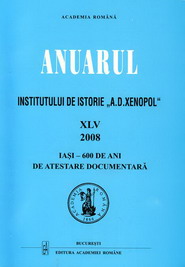Alexandru Ipsilanti şi "testamentul politic" al tatălui său, Constantin Ipsilanti
Alexander Ipsilanti and his father’s, Constantin Ipsilanti, Political Legacy
Author(s): Dragoş PaladeSubject(s): History
Published by: Editura Academiei Române
Keywords: Romanian Principalities; the beginning of the XIXth Century; “Eteria”; Ipsilanti family; Russian Empire
Summary/Abstract: Alexander Ipsilanti strictly observed his father’s (Constantin Ipsilanti) advice. He adopted the Byzantine imperial heraldics, he sought the support of the Romanian Principalities’ former leader’s helpers and aimed at organizing his own personal army. At the same time, the chief of Eteria adopted the fanariot policies and schemes and learned from Constantin Ipsilanti’s political experience, who had divined in Russia its underlying self-oriented leading principles. Evidently the leaders of Eteria and the political factors of Petersburg were not connected, despite the appearances nurtured by the chief of Philiki Etaira. Judging by Ipsilanti’s demeanors in Moldavia and particularly in Wallachia, he did not wish to involve Russia in the Romanian Principalities’ insurection more than the treaties allowed him to. The international context did not enable tzar Alexander I’s interference, especially in supporting the uprisings that tackled monarchic legitimity and contributed to the shattering of the European political balance. Subsequently the main issue was the removal of Ottoman suzerainty from the Romanian Principalities. These should have configured the nucleus of the future Byzantine Empire, which is why attempts at discrediting Russia were made. Ipsilanti’s father’s bequest, centered on seizing rule of the Principalities, and the desire to obtain increased power were the chief originators of Alexandru Ipslanti’s proclamation of Iaşi (23rd February 1821), the one that was to be labeled by historiography as a „monument” of political fallacy.
Journal: Anuarul Institutului de Istorie »A.D. Xenopol« - Iaşi
- Issue Year: XLV/2008
- Issue No: 45
- Page Range: 65-76
- Page Count: 11
- Language: Romanian

